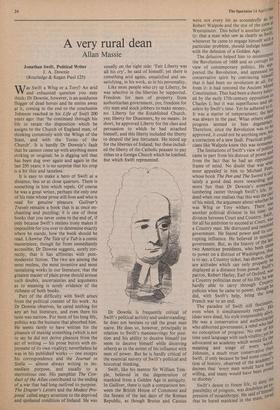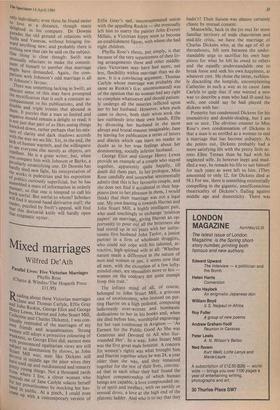A very rural dean
Allan Massie
Jonathan Swift, Political Writer J. A. Downie (Routledge & Kegan Paul £25)
Was Swift a Whig or a Tory? An arid and exhausted question you may think; Dr Downie, however, is an assiduous flogger of dead horses and he smites away at it, coming in the end to the conclusion Johnson reached in his Life of Swift 200 years ago: that 'he continued through his life to retain the disposition which he assigns to the Church of England man, of thinking commonly with the Whigs of the State, and with the Tories of the Church'. It is hardly Dr Downie's fault that he cannot come up with anything more striking or original; he is digging soil that has been dug over again and again in the last 250 years; it is no surprise that his crop is a bit thin and tasteless.
It is easy to make a hero of Swift at a distance, less so at close quarters. There is something in him which repels. Of course he was a great writer, perhaps the only one of his time whose prose still lives and who is read for genuine pleasure. Gulliver's Travels remains a book that is at once en- chanting and puzzling; it is one of those books that you never come to the end of, if only because Swift's restless irony makes it impossible for you ever to determine exactly where he stands, how the book should be read. Likewise The Tale of a Tub is a comic masterpiece, though far from immediately accessible; Dr Downie suggests, surely cor- rectly, that it has affinities with post- modernist fiction. The two are among the most restless, the most inventive and most tantalising works in our literature; that the greatest master of plain prose should arouse such doubts, uncertainties and arguments as to meaning is surely evidence of the richness of both books.
Part of the difficulty with Swift arises from the political content of his work. As Dr Downie observes, he cared nothing for any art but literature, and even there his taste was narrow. For most of his long life, politics was the business that absorbed him. He seems rarely to have written for the pleasure of making something (which is not to say he did not derive pleasure from the act of writing — his prose bursts with en- joyment of its own vitality); nevertheless he was in his published works — one excepts his correspondence and the Journal to Stella — almost always writing to im- mediate purpose, and usually to a meritorious one. His pamphlet The Con- duct of the Allies contributed to the ending of a war that had long outlived its purpose. The Drapier's Letters and the Modest Pro- posal called angry attention to the deprived and spoliated condition of Ireland. He was
usually on the right side: 'Fair Liberty was all his cry', he said of himself; yet there is something arid again, unsatisfied and un- satisfying, in his work, as in his personality.
Like most people who cry up Liberty, he was selective in the liberties he supported. Freedom for men of property from authoritarian government, yes; freedom for city men and stock jobbers to make money, no. Liberty for the Established Church, yes; liberty for Dissenters, by no means. In short, he approved Liberty for the class and persuasion to which he had attached himself, and this liberty included the liberty to despoil the less fortunate. He stood up for the liberties of Ireland, but these includ- ed the liberty of the Catholic peasant to pay tithes to a foreign Church which he loathed, but which Swift represented.
Dr Downie is frequently critical of Swift's political activity and understanding; he does not hesitate to call the great man naive. He does so, however, principally in relation to Swift's manoeuvrings for posi- tion and his ability to deceive himself (or seem to deceive himself while deceiving others) as to the extent of his influence with men of power. But he is hardly critical of the essential naivety of Swift's political and historical thinking.
Swift, like his mentor Sir William Tem- ple, believed in the degeneration of mankind from a Golden Age in antiquity. In Gulliver, there is such a comparison bet- ween the British House of Commons and the Senate of the last days of the Roman Republic, as though Brutus and Cassius
were not every bit as scoundrelly as Sir Robert Walpole and the rest of the crew at Westminster. This belief is another curiosi. ty: that a man who saw as clearly as Swift, whenever he came to engage himself With!, particular problem, should indulge himself with the delusion of a Golden Age. The delusion helped him to misinterpret the Revolution of 1688 and so corrupt his view of contemporary politics. He OP: ported the Revolution, and appeased bits conservative spirit by convincing hirnsel l that it had been no revolution at all. Fa from it: it had restored the Ancient MiX Constitution. That had been a theorybeictv' ed by the early 17th-century opposition le Charles I; but it was superfluous and oh" solete by Swift's time. Yet he adhered to it; It was a matter of temperament; the bes,', was always in the past. What others calla' progress seemed to him degeneracY. Therefore, since the Revolution was to be approved, it could not be anything new, bet a correction of a new fault. Practical Politt. cians like Walpole knew this was nonsense. The limitations of Swift's view of politics came in part from his distrust of power art' from the fact that he had an oPPoshifil frame of mind. No doubt that was what most appealed in him to Michael F°°t' whose book The Pen and The Sword is cerci tainly a good deal more rewarding all t more fun than Dr Downie's solnewhia lumbering canter through Swift's life. 11.1; deed when one realises that this was the cas of his mind, the argument about whether he was Whig or Tory withers. There was another political division in his time: division between Court and Country. Svil s for all his ambition to succeed at Court, a Country man. He distrusted and resented government. He feared power and its cor- rupting rupting influence. He believed in raint11/,„st government. But, as the history of the 1°` e two American presidents, who both chat to power on a distrust of Washington, th'se is to say, a Country ticket, has shown, thebe are attitudes which can only properlYws displayed at a distance from power. SwIl as patron, Robert Harley, Earl of Oxford, was a Country politician most of his lifeCoen , hardly able to carry through ille policies when he came to power, though did, with Swift's help, bring the 10115, French war to an end. The paradox of Swift still fascia His even when it simultaneously repels. .ve. ideas were dead, his style irrepressibly He was a conservative and authoritar2;i who abhorred government, a rebel wil°1this no conception of progress. No one °f be time used language with such vitality; Ye lie advocated an academy which would word, meaning and usage of every Johnson, a much truer conservative ttl_°_,.. Swift, if only because he had some conc .eFs tion of history, observed of the acade.lit,Y decrees that 'every man would have ;A to twildliinsgo,beaynd. many would have been Pr t11: Swift's desire to freeze life, to deny ..- possibility of progress, was doubtless an self pression of misanthropy. He said of bliovs..,( that he hated mankind in the mass, °MY individuals; even these he found easier to love at a distance, though many delighted in his company. Dr Downie Parades the old ground of relations with Stella and Vanessa, without bringing for- ward anything new; and probably there is nothing new that can be said on the subject. One thing is clear though: Swift was unusually reluctant to make the commit- ment of himself to another that marriage might have demanded. Again, the com- parison with Johnson's odd marriage is all in Johnson's favour. There was something lacking in Swift; an obscure sense of this may have prompted the mystification that is such a constant ac- companiment to his publications, and the double and triple ironies that abound in them. It puzzles that a man so limited and negative should remain a delight to read; it is not just that part of us likes seeing things knocked down, rather perhaps that his mix- ture of clarity and dark shadows accords lwith the way we see life. Yet, in the end, the ack of human warmth, and the willingness see everyone else merely as objects, are repellent. He is a great writer, but, when You compare him with Johnson or Burke, a Peculiarly unsatisfying one. Dr Downie has hardly shed new light, his interpretation of the works is pedestrian and his exposition of politics curiously superficial, but he has assembled a mass of information in orderly ,Manner, so that one is tempted to call his book useful. But useful to whom? Scholars will find it second-hand derivative stuff; the .71ader puzzled by Swift's appeal, will find that at this doctorial knife will hardly open hat enigmatic oyster.











































 Previous page
Previous page